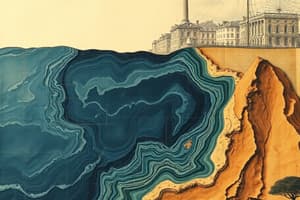Podcast
Questions and Answers
Evaporites form when dissolved salts precipitate out of sea water due to concentration during distillation.
Evaporites form when dissolved salts precipitate out of sea water due to concentration during distillation.
False (B)
Sea water typically contains 35 grams per liter of dissolved ions.
Sea water typically contains 35 grams per liter of dissolved ions.
True (A)
The least soluble compounds precipitate last during the formation of evaporites.
The least soluble compounds precipitate last during the formation of evaporites.
False (B)
Temperature has no effect on the amount of ions precipitated during the formation of evaporites.
Temperature has no effect on the amount of ions precipitated during the formation of evaporites.
Calcium sulphate can precipitate as gypsum or anhydrite during the evaporite formation process.
Calcium sulphate can precipitate as gypsum or anhydrite during the evaporite formation process.
Gypsum and anhydrite are the most commonly encountered evaporite minerals in sedimentary rocks.
Gypsum and anhydrite are the most commonly encountered evaporite minerals in sedimentary rocks.
Evaporites are formed from the precipitation of minerals dissolved in water
Evaporites are formed from the precipitation of minerals dissolved in water
The evaporites in the Michigan Basin are thicker than those in the Messinian of the Mediterranean basin
The evaporites in the Michigan Basin are thicker than those in the Messinian of the Mediterranean basin
Gypsum and anhydrite are examples of irreversible reactions in evaporite formation
Gypsum and anhydrite are examples of irreversible reactions in evaporite formation
Evaporites are commonly found in marine basin settings due to the high evaporation rates
Evaporites are commonly found in marine basin settings due to the high evaporation rates
The Upper Silurian evaporites of the Michigan Basin are older than the Messinian evaporites of the Mediterranean basin
The Upper Silurian evaporites of the Michigan Basin are older than the Messinian evaporites of the Mediterranean basin
Evaporites are commonly found only in marine environments.
Evaporites are commonly found only in marine environments.
Gypsen and anhydrite are examples of evaporite minerals.
Gypsen and anhydrite are examples of evaporite minerals.
Evaporite minerals like gypsen can act as cap rocks to carbonate reservoir rocks.
Evaporite minerals like gypsen can act as cap rocks to carbonate reservoir rocks.
Salt diapirism is a process involving the formation of gypsen.
Salt diapirism is a process involving the formation of gypsen.
Reversible reactions can convert anhydrite into gypsum under certain conditions.
Reversible reactions can convert anhydrite into gypsum under certain conditions.
Flashcards are hidden until you start studying



